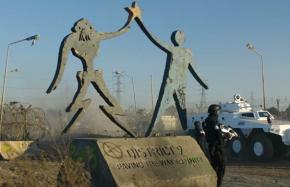Soweto for space aliens
reviews District 9, a film that examines racism and apartheid through a science fiction lens--but its plot raises troubling questions.
DISTRICT 9 is a gripping, action-packed film that easily sucks the audience in and holds your attention from beginning to end.
It is also a troubling film. While it addresses important political issues, it also undermines them with the sensibilities that go into Hollywood filmmaking.
The film is set in the mythical present, when an alien spacecraft stalls out over Johannesburg, South Africa. This huge lumbering ship dominates the sky.
Obviously, this creates a world sensation. There is, however, an eerie silence from the ship. No communication, no sign of life. After three months, the South African government orders its troops to break into the ship and find out what’s going on..
They find hundreds, if not, thousands of frightened, starving aliens on board. They are as tall as human beings, but insect-like in appearance, with lobster hands. They are quarantined in a part of Johannesburg, in a huge outdoor prison hellhole reminiscent of the Soweto ghetto. The aliens, despite their obvious, superior technology and ability to travel across the galaxy, are treated as despised, dangerous, unwanted immigrants. They are derisively called "prawns" and are preyed upon by guards and thugs.

The only interest that the human race appears to have in the aliens is their weapons technology--technology that human scientists can't access because of safety features that the aliens won't give up. Despite the horrendous conditions the aliens live in, their population explodes over a 20-year period. A demand arises for the aliens to be moved further away from the city. Despite some liberal hand wringing, the aliens appear to have no organized, meaningful supporters on our planet.
The job of evicting them is given to a super-sized version of the private mercenary group Blackwater called "Multi-National United" (MNU). MNU supplies thousands of mercenaries for operations that governments don't want to do, and it is also into weapons and genetic research. If you are looking for total evil, MNU is your convenient one-stop shopping center.
The person who is to lead the eviction operation is the hapless MNU bureaucrat Wikus van der Merwe (Sharlto Copley), who somehow married the boss' daughter. He can't figure out that he's the fall guy.
Just in case you haven't seen the film, I won't say anything else about the story except to say that it is at this point that everything for MNU starts to go wrong.
THE APPEAL of District 9 is that it addresses two issues that are of great concern for many people across the globe: the resurgence of violent xenophobia against immigrants and the decline of civil liberties. The film does a good job addressing these issues and this is helped by the amazing special effects that make the aliens look very real. You never get a sense that you are looking at underpaid actors crammed into uncomfortable costumes.
There is a long tradition of using science fiction and fantasy to address controversial subjects. "I found that it was all right to have Martians saying things Democrats and Republicans could never say," producer and host of the Twilight Zone Rod Serling once explained. Serling "was often hounded by the conservative censors for his uncompromising attention to issues such as lynching, union organizing and racism," according to a profile of him on the PBS American Masters Web site.
However, other aspects of District 9 undermine what the film gets right. While it is supposed to be addressing worldwide issues of bigotry and racism, the film's South African setting undermines this. The vast majority of the commentators (the film is shot in a documentary style) are white South Africans--you never feel like you are watching a film about the wider world.
This leads to another problem with the film: You would get the impression that South Africa is run by white people. There is such an imbalance of Black versus white actors that it is very strange. Is it the case that District 9 producer Peter Jackson and director Neill Blomkamp didn't believe that a cast of predominately Black actors would attract an audience?
One of the more racist aspects of the film is the portrayal of the "Nigerians" who run the black market operations in the alien slum. They are one-dimensional, cannibalistic psychopaths. It is as if Jackson and Blomkamp felt they had to throw an "Africa-out-of-control" element into the film for "realism."
Most of the aliens are lost and oppressed because they have lost any bearings because of their imprisonment. Two of the aliens toward the end express "human emotions and desires," yet the Nigerians are never given the same consideration. They are never portrayed as "human." This is not the first time that these troubling issues have appeared in Peter Jackson's films. His remake of King Kong was especially guilty of this.
Overall, District 9 is a mixed bag. It is worth seeing and arguing about.


